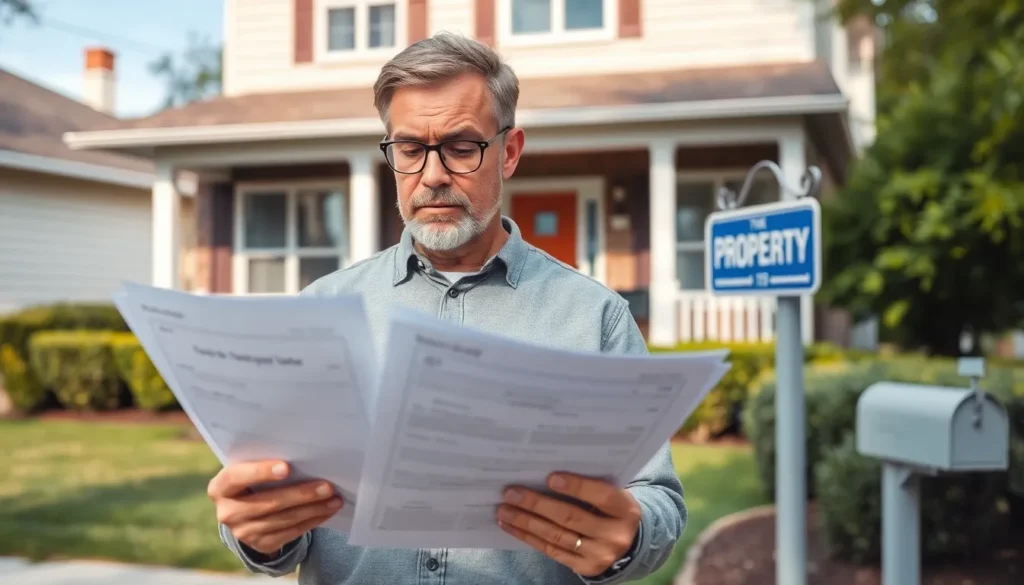Table of Contents
ToggleDreaming of a getaway that pays for itself? Buying vacation rental property might just be your ticket to financial freedom and endless beach days. Imagine sipping a piña colada while your investment works harder than a barista on Monday morning. It’s not just about owning a slice of paradise; it’s about turning that slice into a cash-generating machine.
Understanding Vacation Rental Properties
Buying vacation rental property offers both personal enjoyment and potential profit. Understanding the key aspects of vacation rentals aids in making informed investment choices.
What Is a Vacation Rental Property?
A vacation rental property refers to a residential dwelling rented out to travelers for short stays. These properties encompass various types, such as single-family homes, condos, and cabins. Owners lease out the entire property or specific rooms through platforms like Airbnb or Vrbo. Regulations regarding these rentals can vary by location, impacting availability and profitability. Investors often focus on high-demand tourist areas, where rental occupancy rates are higher.
Benefits of Investing in Vacation Rentals
Investing in vacation rentals presents multiple advantages. First, property owners can enjoy personal use of their investment during non-peak seasons. Second, rental income can offset mortgage payments, leading to financial stability. Third, tax benefits often apply to rental properties, including deductions for operating expenses. Cash flow may increase significantly during peak tourism months, generating substantial profit. Lastly, demand for vacation rentals continues to rise, especially in popular destinations, ensuring a competitive market.
Key Considerations When Buying

Understanding key considerations is essential when purchasing vacation rental property. Key factors like location, market demand, property type, and features can significantly impact investment success.
Location and Market Demand
Location plays a crucial role in vacation rental investments. High-demand areas with attractive amenities draw more tourists, leading to higher occupancy rates. Popular destinations near beaches, national parks, or urban centers often guarantee stronger returns. Research local tourism trends, seasonal patterns, and average rental rates. Areas with limited available properties can witness increased demand, resulting in profitability. Additionally, proximity to attractions enhances guest appeal, ensuring a steady flow of visitors throughout the year.
Property Type and Features
Property type influences rental potential and guest experience. Single-family homes, condos, and cabins each attract different markets. Consider features that enhance guest satisfaction, such as modern amenities, spacious layouts, and outdoor spaces. Popular features like pools, hot tubs, or proximity to public transportation can increase property value. Analyze competition in the area, noting which types of properties receive the most bookings. A well-maintained property with desirable features stands out, ensuring higher occupancy rates and repeat guests.
Financing Your Vacation Rental
Financing a vacation rental requires careful consideration of available options and potential returns. Understanding these aspects empowers investors to make informed financial decisions.
Mortgage Options for Vacation Rentals
Investors commonly explore various mortgage options specifically designed for vacation rentals. Traditional loans typically offer terms suited for primary residences, but lenders may impose stricter criteria for investment properties. Conventional loans remain an option, with down payments often ranging from 15% to 25%. Additionally, investors might consider FHA loans, which require lower down payments but come with certain limits on rental income. Options also include portfolio loans from local banks, which can provide more flexible qualifying criteria. Interest rates generally reflect the risk associated with investment properties, impacting overall financing costs.
Expected Returns on Investment
Expected returns on vacation rentals depend on several factors, including location and market demand. Investors often target areas with high tourism rates and attractive amenities, as these typically correlate with greater occupancy. Returns often fall between 8% and 12% annually, based on rental income and property appreciation. Cash flow analysis remains essential for assessing profitability, accounting for expenses such as maintenance, property management, and taxes. Knowledge of seasonal trends can improve revenue forecasts. Engaging in proactive marketing strategies and excellent guest relations can enhance occupancy rates, thereby increasing overall returns.
Managing Your Rental Property
Managing a vacation rental property requires a strategic approach to maximize returns and enhance guest experiences. Owners can choose between self-management or hiring a property manager.
Self-Management vs. Property Management
Self-management offers hands-on control over operations. Owners can set their own cleaning schedules, adjust rental rates, and establish personal connections with guests. Yet, it demands time and effort. Property management companies handle logistics like marketing, bookings, and maintenance. While this option involves fees, it allows owners to focus on other endeavors. Each choice has advantages that fit different lifestyles and investment goals.
Marketing Your Vacation Home
Marketing is essential for attracting guests to a vacation rental. Utilizing online platforms like Airbnb and Vrbo expands visibility. Stunning photography showcases property features, enticing potential renters. Crafting engaging listings with clear descriptions highlights unique amenities, such as hot tubs or proximity to attractions. Additionally, leveraging social media enhances exposure to broader audiences. Encouraging positive guest reviews builds credibility and drives future bookings, contributing to overall profitability.
Legal and Tax Implications
Investing in vacation rental property involves understanding various legal and tax implications that can affect profitability. Awareness of these factors is essential for maximizing returns.
Zoning Laws and Regulations
Zoning laws dictate how properties can be used. Different jurisdictions impose varying regulations on vacation rentals, impacting operational viability. In some areas, obtaining permits is necessary for short-term rentals, while others may restrict rental durations. Failing to comply with local laws can lead to fines or forced closures. Researching these regulations before purchasing protects the investment. Additionally, homeowner associations may enforce their own rules, influencing rental options. Understanding these stipulations helps in making informed decisions about potential purchases.
Tax Benefits and Obligations
Tax implications significantly affect the financial outcomes of vacation rentals. Owners can often deduct mortgage interest, property taxes, maintenance expenses, and depreciation on their taxes. Larger expenses incurred while managing the property may also qualify for deductions. Rental income generated from these properties must be reported to the IRS, creating potential tax obligations. Engaging a tax professional knowledgeable in real estate can help navigate these complexities. Familiarity with local tax laws ensures compliance and optimizes potential tax advantages, ultimately improving overall investment performance.
Investing in vacation rental property can be a rewarding venture that combines personal enjoyment with financial gain. By carefully selecting the right location and understanding market dynamics, investors can maximize their returns while providing memorable experiences for guests.
Effective management and strategic marketing play crucial roles in maintaining high occupancy rates and attracting repeat visitors. Additionally, staying informed about legal regulations and tax implications ensures a smoother investment journey.
With the right approach and thorough research, vacation rental properties can become a valuable asset that contributes significantly to financial freedom.







